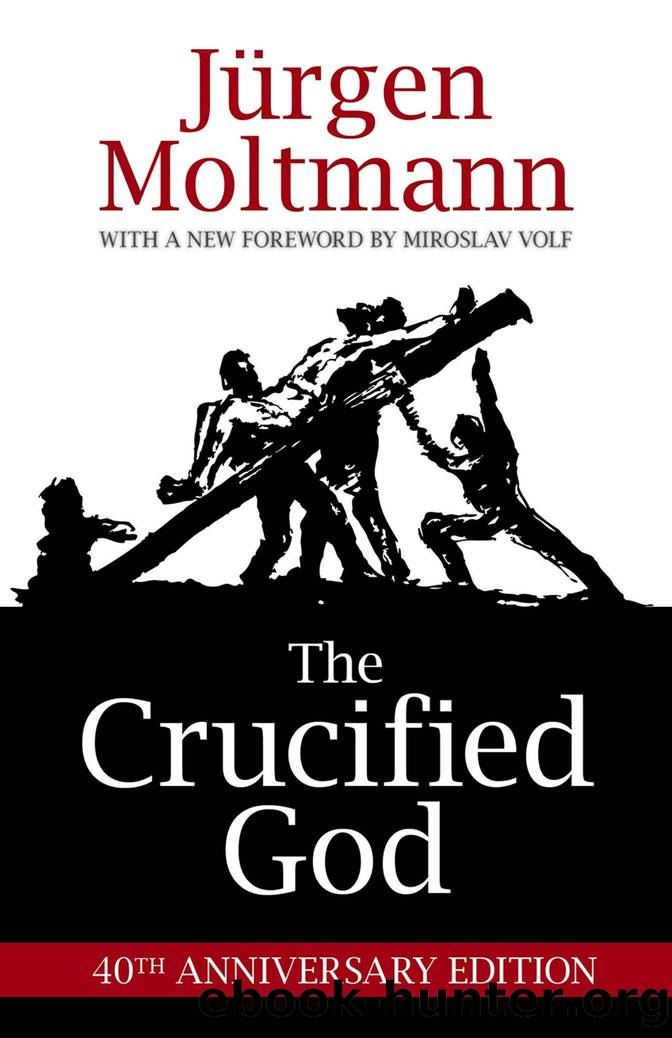The Crucified God by Jurgen Moltmann

Author:Jurgen Moltmann [Moltmann, Jurgen]
Language: eng
Format: epub
ISBN: 9781506402963
Publisher: Fortress Press
Published: 2015-10-31T22:00:00+00:00
To sum up:
1. Apocalyptic is a syncretistic formation with more than one idea. But at its centre we do not find anthropology or universal history, but the expectation of the future victory of the righteousness of God over dead and living. The ‘resurrection of the dead’ has no significance of its own, but is thought of as a conditio sine qua non for the universal achievement of righteousness in the judgment upon righteous and unrighteous.
2. Jesus’ proclamation was apocalyptic in form, as far as, like John the Baptist, he proclaimed the imminence of the distant kingdom. In fact, however, Jesus broke through legalistic apocalyptic, because he proclaimed justitia justifacans rather than justitia distributiva as the righteousness of the kingdom of God, and anticipated it in the law of grace among the unrighteous and those outside the law.
3. In form, the resurrection message of the early community was an apocalyptic anticipation of what was to come, but in content it was the proclamation of the crucified Christ as the Lord of righteousness. The scandal was not the message that one man had been raised before all others in the final judgment and the kingdom of God, but the certainty that this one man was the crucified Jesus. In form, Christian faith in the resurrection is eschatological faith. In content, this eschatological faith is Christian, because it proclaims the resurrection of the crucified Christ. The Christian belief in the resurrection does not proclaim world-historical tendencies or anthropological hopes, but the nucleus of a new righteousness in a world where dead and living cry out for righteousness.
4. The hermeneutic point for the understanding of Christian faith in the resurrection must therefore be sought in the question of righteousness in the history of the suffering of the world. This is an open question, which cannot either be answered or given up. The horizon of universal history and the depths of historical existence provide a framework to help in answering this question. The horizon of universal history makes clear the breadth of the question of righteousness in the form of the question of theodicy, whereas the existential dimension makes clear the depth of this question of righteousness in the question of justification.
5. The dispute over the resurrection of Jesus is concerned with the question of righteousness in history. Does it belong to the nomos which finally gives each man his deserts, or does it belong to the law of grace as it was manifest by Jesus and in the resurrection of the crucified Christ? The message of the new righteousness which eschatological faith brings into the world says that in fact the executioners will not finally triumph over their victims. It also says that in the end the victims will not triumph over their executioners. The one will triumph who first died for the victims and then also for the executioners, and in so doing revealed a new righteousness which breaks through the vicious circles of hate and vengeance and which from the lost victims and executioners creates a new mankind with a new humanity.
Download
This site does not store any files on its server. We only index and link to content provided by other sites. Please contact the content providers to delete copyright contents if any and email us, we'll remove relevant links or contents immediately.
Christian Ethics by Wilkens Steve;(854)
Christian Ethics for a Digital Society by Kate Ott(774)
Fearfully and Wonderfully Made by Philip Yancey & Paul Brand(755)
God and the Multiverse by Victor J. Stenger(665)
Numbers by Ronald B. Allen(629)
How to Read Slowly by James W. Sire(608)
Christian Ethics: An Introduction to Biblical Moral Reasoning by Wayne Grudem(589)
The City of God by Saint Augustine & Marcus Dods(565)
Morality by Jonathan Sacks(564)
Monastic Archaeology by Unknown(558)
The Technological System by Jacques Ellul(542)
Amish Grace by Donald B. Kraybill & Nolt Steven M. & Weaver-Zercher David L(521)
The Disabled Church by Rebecca F. Spurrier;(516)
Jesus: A New Vision by Whitley Strieber(514)
Death of the Doctor by Unknown(512)
Children of Lucifer; The Origins of Modern Religious Satanism by Ruben van Luijk(503)
Critical Writings by Joyce James;(499)
Redeeming Sociology by Vern S. Poythress(476)
The Church in the Early Middle Ages by G.R. Evans(464)
